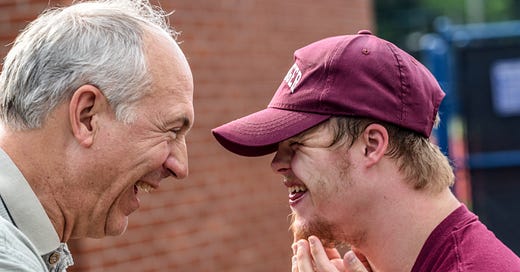Photo by Nathan Anderson on Unsplash
What can aging adults do to live longer and stave off dementia? For four decades scientists and social scientists have been looking for answers to this question, motivated by dramatic increases in Alzheimer’s Disease and an even more dramatic increase in the aging population, as 71 million Baby Boomers march inexorably towards our dotage.
Based on years of research, there is one proven answer, and you may be shocked to it is not one of the following oft-touted elixirs: Fish oil, ginkgo biloba, memory supplements, crossword puzzles, Aduhelm, yoga, Viagra, or extra helpings of kale. Save your money.
What does seem to be most effective in delaying mortality and dementia, the studies consistently prove, is engagement. In other words, people. People who need people are the luckiest people when it comes to longer lives and longer sentience.
Here is a quick review of what scientists have determined to date:
· Elders who either participate socially (attend clubs, associations, and societies) or have social networks (marital status, frequent contact with friends and relatives) live longer than elders who have neither, when other variables are controlled.
· Elders who volunteer frequently live significantly longer than non-volunteers when other variables are controlled. The greatest difference is among those who visit friends frequently or attend religious services.
· Volunteering is associated strongly with higher levels of cognitive function and slower cognitive decline. The evidence suggests that prosocial behaviors are directly associated with biological systems and may modify gene regulation to confer health benefits.
· Elders who engage in either formal (in a structured organization) or informal (such as family-based) volunteering get a beneficial effect when elders feel appreciated for their work.
However, if you read carefully, you’ll note what it does not say: that social activity causes elders to live longer. Because for all we know, it may not be the activity that makes a difference, but the attitude of people who are inclined to pursue that activity. If you’re a positive person who feels you have a contribution to make, and that leads you to volunteer, and as a result of your social engagement you stave off mortality and dementia longer than your contemporaries, does the credit go to the activity or the attitude?
“It’s hard to tell what’s chicken and what’s egg,” says Dr. Carla Rosenthal, a Baltimore gerontologist who helped me track down the research studies. She confirms, however, that the research findings are consistent with what she has seen with her own patients. “What provides the most resiliency is being a teacher – of anything, to anyone. Contact across generations becomes inspirational for both older and younger.”
Along a similar vein, the research of Dr. Becca Levy of Yale University has shown that elders who accept society’s prevalent messages of ageism – that old age is a state of decline and uselessness – have a shorter life expectancy than those who defy those messages and continue to act purposefully. Again the question: is it the attitude or the activity?
This question of social activity has huge implications for me and my fellow introverts who were quite comfortable during the late period of social isolation and, going forward, would just as soon remain in our cozy caves. If we are to react correctly to this information, what is the appropriate response? Should we sign up for volunteer activities at once? Or should we work on shaping our attitudes to be more positive towards social engagement?
Alas, we are approaching are the limits of what science can tell us. All sciences have a bias toward what can be measured. Many scientists take the position that what cannot be measured isn’t knowable. Despite the best efforts of two centuries of scientific exploration, vast areas of the human brain remain uncharted, and human behavior is peculiarly resistant to precise measurement. How is one to measure the degree to which a person feels a sense of life purpose? How does one measure the reward one feels in passing knowledge down to a younger generation? Is there a precise measurement for the satisfaction of feeling needed?
But this much we do know: If you intend to live longer and keep your brain running on all cylinders, the smart money is on emerging from the cave and mixing it up with family, friends, and other people who need people like you. It also helps if you believe ageism is a bunch of hooey, your life has purpose, and you absolutely have valuable gifts to offer the world. So go forth and believe!





I think you've got it right, Don! Engagement is so important! But...I think to add light exercise that pumps the blood through the veins and up to the brain doesn't hurt!
We live on with a little help from our friends.